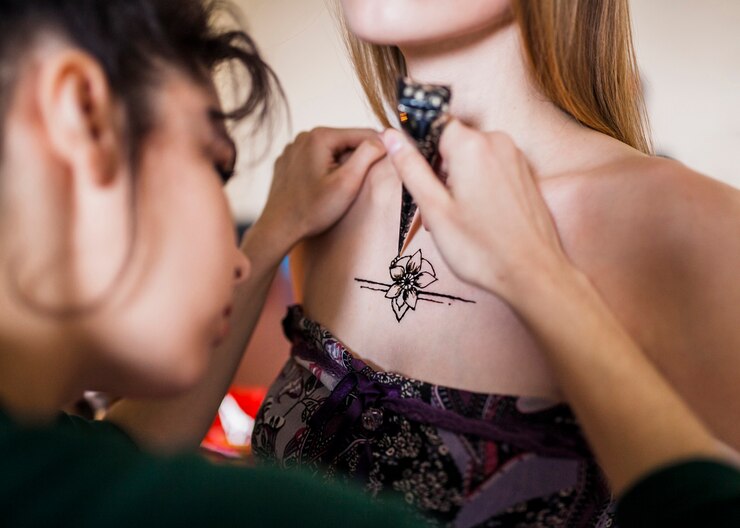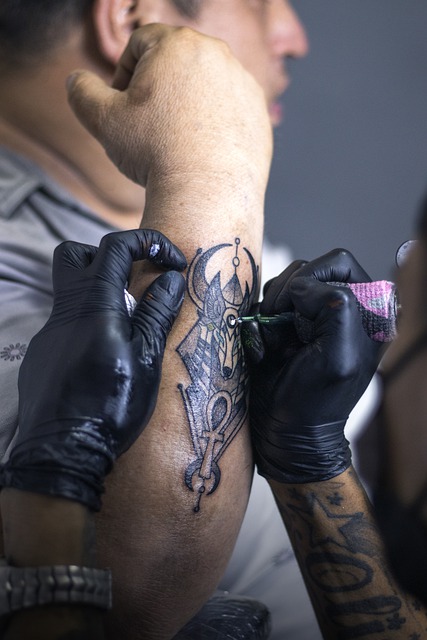A small tattoo is typically considered to be any tattoo that is 3 inches or less in size. This can include simple designs such as symbols, words, or small images. Small tattoos are often placed in discreet locations and can be easily covered up if needed. Knowing the amount of time required to complete a small tattoo is crucial for several reasons.
Firstly, it can help you plan your schedule and prepare for the appointment accordingly.
Secondly, it can give you an idea of what to expect during the tattooing process, including the amount of pain, discomfort, and breaks required.
Lastly, understanding the time required can help you manage your expectations for the final result, as the level of detail and intricacy can be affected by the amount of time allotted for the tattoo.
The time required for a small tattoo is influenced by several key elements. Let’s delve into each of them:
The time of a small tattoo depends on various factors
Design Complexity: The intricacy and complexity of the tattoo design play a significant role in determining the time needed for completion. A simple and minimalistic design may take less time compared to a detailed and intricate pattern that requires meticulous attention to detail.
Tattoo Size: While the term “small tattoo” is subjective, generally, it refers to a design that can fit within the palm of your hand or is relatively small in scale. Larger small tattoos may require more time to complete due to the increased area that needs to be covered.
Artist’s Skill and Experience: The proficiency and expertise of the tattoo artist also impact the duration of the process. Highly skilled and experienced artists may work more efficiently, completing the tattoo in a shorter timeframe while ensuring precision and quality.
Tattoo Placement: The placement of the small tattoo on your body can affect the time it takes to complete. Areas with more curves, contours, or sensitive skin may require additional time for the artist to work carefully and ensure optimal results.
Client’s Pain Tolerance: Pain tolerance varies among individuals, and some clients may need occasional breaks during the tattooing process. These breaks can prolong the overall time required to complete the tattoo.
Considering these factors, a small tattoo can typically take anywhere from 15 minutes to a few hours to complete. Simple designs with minimal details may be finished within a shorter duration, while larger small tattoos or designs with intricate patterns may require multiple sessions spanning several hours or even weeks.
It is essential to note that the tattooing process includes several stages, including design consultation, stencil placement, outlining, shading, and coloring. Each stage contributes to the overall time invested in achieving the desired small tattoo.
To determine a more accurate timeframe for your specific small tattoo, it is advisable to consult with a professional tattoo artist. They can assess your design, discuss your expectations, and provide a better estimate based on their expertise and experience.
Consultation with the Tattoo Artist
Before getting a small tattoo, it’s important to have a consultation with the tattoo artist. This can help ensure that both you and the artist are on the same page regarding the design, placement, and overall vision for the tattoo.
Importance of a Consultation
A consultation is essential to the tattoo process, as it allows you to discuss your ideas and preferences with the artist. It also gives the artist an opportunity to assess your skin and determine if any adjustments need to be made to the design or placement of the tattoo.
What to Expect During a Consultation
During a consultation, the artist may ask you questions about your design ideas, preferred placement, and overall vision for the tattoo. They may also provide recommendations based on their expertise and experience. Additionally, the artist may show you their portfolio and discuss their process for tattooing.
Preparing for a Tattoo
Before your appointment for a small tattoo, there are several things you can do to ensure that you’re well-prepared for the process.
What to Do Before the Appointment:
Make sure you eat a full meal before your appointment, as this can help you feel more energized and prevent dizziness or lightheadedness during the tattoo process. Additionally, it’s a good idea to wear comfortable clothing that will allow the artist easy access to the area being tattooed.
Proper Hygiene and Skin Care:
It’s important to ensure that the area being tattooed is clean and free from any lotions, oils, or perfumes. Wash the area with mild soap and warm water before your appointment, and avoid using any harsh scrubs or exfoliants.
Avoiding Alcohol, Caffeine, and Blood-Thinning Medications:
Alcohol, caffeine, and blood-thinning medications can all thin the blood and increase bleeding during the tattooing process. It’s best to avoid these substances for at least 24 hours before your appointment to reduce the risk of excessive bleeding.
Getting a Good Night’s Sleep:
A good night’s sleep can help you feel more relaxed and calm during the tattoo process. Aim for 7-8 hours of sleep the night before your appointment to help ensure that you’re well-rested and prepared.
Aftercare for a Small Tattoo
Once your small tattoo is complete, it’s important to take proper care of it to ensure that it heals well and looks its best.
Cleaning and Moisturizing the Tattoo:
Your tattoo artist will provide you with instructions for cleaning and moisturizing your tattoo. Generally, you’ll need to wash the area gently with mild soap and water, then pat it dry with a clean towel. Apply a thin layer of fragrance-free moisturizer or tattoo aftercare product to keep the area hydrated and promote healing.
Avoiding Direct Sunlight and Swimming:
Exposure to direct sunlight and swimming can both damage a new tattoo and increase the risk of infection. Avoid exposing your tattoo to direct sunlight for at least 2-3 weeks after getting it, and avoid swimming or soaking in water for at least 2 weeks.
Wearing Loose Clothing:
Wearing loose clothing can help prevent irritation and rubbing on the tattooed area. Choose comfortable, breathable fabrics that won’t stick to the tattoo or cause discomfort.
Signs of Infection or Complications:
It’s important to be aware of the signs of infection or complications following a tattoo. These can include redness, swelling, pus or discharge, fever, or extreme pain. If you experience any of these symptoms, contact your tattoo artist or a medical professional immediately.
How Long Does a Small Tattoo Take to Heal?
After getting a small tattoo, it’s important to understand how long it will take to heal fully.
Normal Healing Time for a Small Tattoo:
In general, a small tattoo will take approximately 2-3 weeks to heal fully. During this time, you may experience some discomfort, itching, and scabbing as the area heals.
Factors That Can Affect Healing Time:
Several factors can affect how long it takes for a small tattoo to heal fully. These include the size and complexity of the design, the location on the body, and your overall health and immune system. Additionally, poor aftercare or exposure to irritants or bacteria can delay the healing process.
Signs of Complications During the Healing Process:
It’s important to be aware of the signs of complications during the healing process, as these can indicate that the tattoo is not healing properly. These signs can include excessive pain, swelling, redness, or the formation of pus or discharge around the tattooed area. If you experience any of these symptoms, contact your tattoo artist or a medical professional immediately.
FAQ
Q1.Can I Get a Small Tattoo Done in One Session?
It depends on the complexity of the design and the skill level of the tattoo artist.
Q2. How Much Does a Small Tattoo Cost?
The cost ranges from $50 to $200, but prices vary depending on several factors.
Q3. Can I Work Out After Getting a Small Tattoo?
It’s generally recommended to avoid exercise for the first few days.
Q4. How Do I Know If My Tattoo Is Infected?
Signs of infection include redness, swelling, warmth, pus or discharge, and a fever.
Q5.Can I Remove a Small Tattoo If I Change My Mind?
Yes, it is possible through laser treatments or surgical excision. Discuss the risks and benefits with a qualified medical professional.
Conclusion
Small tattoo can be a meaningful and beautiful addition to your body art collection. However, it’s important to take the time to properly plan and care for your tattoo to ensure the best possible outcome. Factors such as design complexity, artist skill level, size, placement, skin type, and aftercare can all affect the time required for a small tattoo and its overall appearance and longevity. Remember to communicate openly with your tattoo artist, take proper care of your tattoo before and after the appointment, and seek medical attention if you experience any signs of infection or complications.


